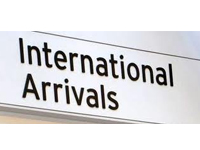
Australian tourism needs to focus on service standards to keep Chinese market in the ‘magic millions’ club, says TAA
Growing the Chinese inbound market to over one million visitors is a triumph for Australian tourism, says TAA chair Martin Ferguson, but the industry will need to be able to access higher-levels of skilled workers if Australia is to continue growing the market.
In figures released by the Australian Bureau of Statistics, China increased its visitor numbers to Australia by 21.6% (177,900) to 1,001,200 in the year ending November 2015.
Mr Ferguson, a former federal tourism minister, said the Australian tourism and hospitality industry had stepped up to the mark to attract greater numbers of Chinese visitors, with Tourism Australia and the government providing support through proactive marketing, free trade agreements and facilitation of bilateral airline agreements. However, with international competitors increasingly targeting China for their tourism business, Australia would need to offer the highest levels of service to maintain and grow its market position.
“The federal government has rightfully identified tourism as one of five major national investment priorities, but a recent report on the Australian Tourism Labour Force identified that the industry would need some 123,000 additional workers, including over 60,000 skilled positions, by 2020 if we are to keep up with demand,” said Mr Ferguson.
“The hotel industry is undertaking its largest expansionary phase in decades, which will provide the quality of accommodation needed by the Chinese market, but staffing and service standards are equally important, and the industry has reached a bottle neck in terms of skilled workers.
“While hotel groups are doing their best to recruit and train, a combination of outdated industrial relations conditions and restrictions on temporary skilled migration is holding back the industry’s potential to grow employment and enhance service standards.
“Current minister for tourism, senator Colbeck, stated yesterday that ‘there is still more work to be done to ensure we can cater for the increased demand into the future and to encourage tourists to visit our unique rural and regional areas’. He is very correct in this view, with labour shortages one of the most critical factors affecting regional and remote performance. We would call on the Government to act urgently to address these issues to ensure operators can access skilled staff to provide high quality service standards.
“When international visitors come to this country they – just like Australians – expect to see restaurants, shops and attractions open across weekends and on public holidays, but with 1950s industrial relations conditions still in place, it is a disincentive for businesses to open. We hope that the Fair Work Commission will follow the lead of the productivity commission and accept that IR provisions need to be updated to the 21st century to benefit both tourism businesses and workers.”

AccomNews is not affiliated with any government agency, body or political party. We are an independently owned, family-operated magazine.






